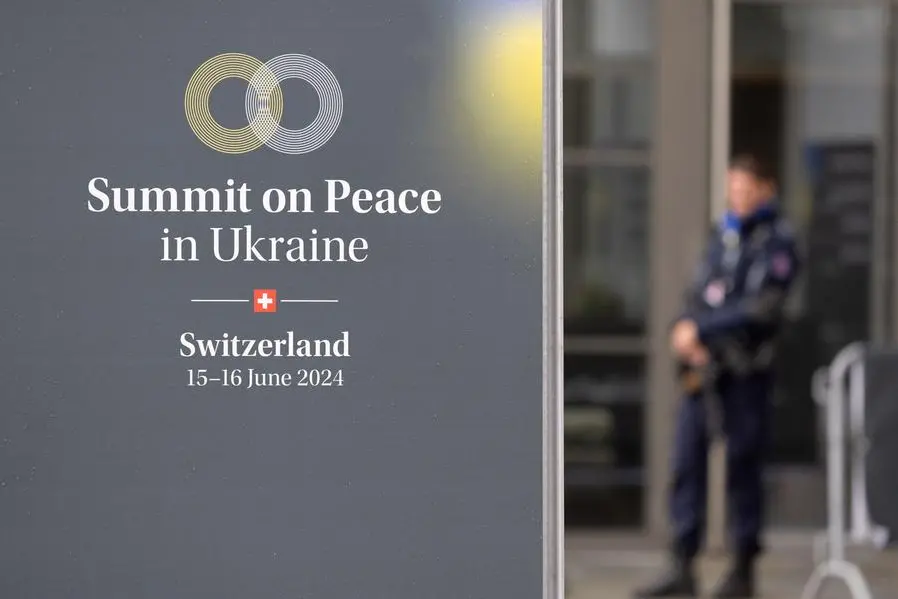PHOTO
LUCERNE, Switzerland - World leaders began gathering in Switzerland on Saturday for a summit to pressure Russia to end its war in Ukraine, but the absence of powerful allies of Moscow such as China will blunt its potential impact.
Dozens of allies of Ukraine will take part, but China is staying away after Russia was frozen out of proceedings on the grounds it had dismissed the event as a waste of time and had no interest in attending.
China's absence means hopes the summit will show Russia as globally isolated have faded, while recent military reverses have put Kyiv on the back foot. The war in Gaza between Israel and Hamas has also diverted the world's attention from Ukraine.
The talks are expected to focus on broader concerns triggered by the war, such as food and nuclear security and freedom of navigation, and a draft of the final declaration identifies Russia as the aggressor, sources said.
German Chancellor Olaf Scholz called the event an important step towards progress. "Many questions of peace and security will be discussed, but not the very biggest. That was always the plan," he said, speaking to Welt TV before travelling to Switzerland.
"This is a small plant that needs to be watered, but of course also with the perspective that more can then come out of it."
Around 100 countries and organizations have committed to the two-day gathering at the Buergenstock, a mountaintop resort in central Switzerland.
On the eve of the gathering Russian President Vladimir Putin said Russia would end the war only if Kyiv agreed to drop its NATO ambitions and hand over the entirety of four provinces claimed by Moscow - demands Kyiv swiftly rejected as tantamount to surrender.
Putin's conditions apparently reflected Moscow's growing confidence that its forces have the upper hand in the war. Scholz cast them as an attempt to muddy the waters.
"Everyone knows that this is not a serious proposal, but had something to do with the peace conference in Switzerland," he told ZDF television in a separate interview.
Moscow casts what it calls its special military operation as part of a broader struggle with the West, which it says wants to bring Russia to its knees. Kyiv and its allies reject this and accuse Russia of waging an illegal war of conquest.
Switzerland, which took on the summit at the behest of Ukrainian President Volodymyr Zelenskiy, wants to pave the way for a future peace process that includes Russia.
But geopolitical splits have dogged the event.
CHINA AND RUSSIA
Zelenskiy has accused Beijing of helping Moscow undermine the gathering, an accusation China's foreign ministry denied.
"The summit risks showing the limits of Ukrainian diplomacy," said Richard Gowan, U.N. Director at the International Crisis Group. "Nonetheless, it is also a chance for Ukraine to remind the world that it is defending the principles of the U.N. Charter."
China had said it would consider taking part, but ultimately declined because Russia would not be there.
"It's clear that at the moment, in geopolitical terms, for China the special relationship with Russia takes precedence over any other consideration," said Bernardino Regazzoni, a former Swiss ambassador to China.
The summit has also had to contend with an alternative plan floated by China.
U.S. Vice President Kamala Harris and the leaders of France, Germany, Italy, Britain, Canada and Japan are among those due to attend. India, Turkey and Hungary, which maintain friendlier relations with Russia, are also expected to join.
European officials privately concede that without support from Moscow's main allies, the summit's impact will be limited.
"What can (Zelenskiy) hope for out of it?" said Daniel Woker, a former Swiss ambassador. "Another small step forward in international solidarity with Ukraine as the victim of Russian aggression."
Polish President Andrzej Duda said the summit aimed to bring home to more geographically distant countries the scale of the threat to the world posed by Moscow.
Supporters of Ukraine are marking the talks with a series of events in the nearby city of Lucerne to draw attention to the war's humanitarian costs, with a demonstration planned to call for the return of prisoners and children taken to Russia.
(Reporting by Dave Graham, John Revill, Thomas Escritt, Emma Farge, Alan Charlish Writing by Dave Graham and Matthias Williams Editing by Angus MacSwan and Frances Kerry)





















